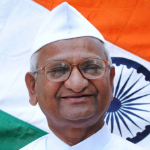Anna Hazare is one of India’s most renowned social reformers.
On being named a finalist for the Allard Prize, Mr. Hazare said:
“I am very happy to know that I have been selected as a finalist for the Allard Prize for International Integrity. I have been fighting for the last 25 years against corruption, to decentralize the power in government and to increase public participation in the development of the country. The Allard Prize encourages me to further my work.”
Mr. Hazare has led successful movements to advance rural development, enhance government transparency and investigate and prosecute official corruption. He has also played a leading role in educating people in India about their fundamental rights and encouraging them to raise their voice against unlawful practices like corruption.
Following a career as a soldier in the Indian army, Mr. Hazare dedicated himself to improving conditions in the village of his birth, Ralegan Siddhi. His efforts to end soil erosion, conserve rain water, and improve education are credited with transforming the village into a model for sustainable development in rural India. Recognizing that government corruption was a persistent obstacle for rural development, in 1991 Mr. Hazare launched the People’s Movement Against Corruption, which brought to justice many cases of corruption by government officials.
Since then, Mr. Hazare has campaigned tirelessly for strong transparency and anti-corruption legislation at both the state and national levels. In 2003, he led a popular movement and undertook a 12 day hunger strike at Azad Ground in Mumbai, which successfully drove the Maharashtra state government to enact a revised Maharashtra Right to Information Act. This legislation became the basis for the Right to Information Act enacted by the Government of India in 2005.
In 2011, Mr. Hazare founded India Against Corruption, a national apolitical movement dedicated to eradicating graft across the country. That same year, he led a series of hunger strikes and massive public demonstrations to urge Indian legislators to enact Jan Lokpal legislation, which would create an independent ombudsman body with the power to investigate any public official, including the prime minister. Mr. Hazare along with scores of his supporters were arrested and jailed for their activities. Ultimately, the campaign garnered national and international support and successfully led to the formation of a joint government-civil society committee to draft the legislation.
After three months of work, the joint committee presented a draft Jan Lokpal Bill to the government, but it was met with inaction and delay. On August 16, 2011 Mr. Hazare began an indefinite hunger strike at Ramilila Ground in Dehli, demanding the government introduce the Jan Lokpal Bill. The hunger strike inspired a national movement of demonstrations, marches, rallies, and the use of social media to organize, communicate and raise awareness. Millions of people took to the streets across the country, compelling the Parliament of India to call for a special session on the night of August 27, where it passed a resolution to implement three key elements of the Jan Lokpal Bill. The events made headlines around the world, with TIME Magazine naming the movement one of the Top 10 News Stories of 2011.
Learn more about the Allard Prize for International Integrity here.

